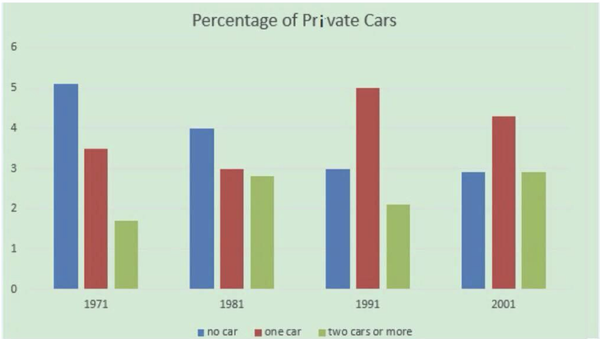Trang chủ Blog Bài thi IELTS mẫu Bài mẫu IELTS Sample Writing IELTS Writing Task 1: Household Car Ownership 1971–2001
IELTS Writing Task 1: Household Car Ownership 1971–2001
- Vân Lam
- Bài mẫu IELTS Sample Writing, Bài mẫu Task 1 IELTS Writing sample, Bài thi IELTS mẫu
MỤC LỤC
Đề bài: The chart below shows the changes in percentage for household cars in a European Country between 1971 and 2001.
Summarize the information by selecting and reporting the main features, and make comparisons where relevant.
(Biểu đồ dưới đây cho thấy sự thay đổi tỉ lệ phần trăm lượng xe hơi mà các hộ gia đình sở hữu tại một nước châu Âu từ năm 1971 đến năm 2001.
Tóm tắt thông tin bằng cách chọn lọc những đặc điểm chính và đưa ra những so sánh cần thiết.)
SAMPLE
Provided is the bar graph comparing the percentage of cars ownership in a European nation’s households being surveyed across 3 decades from 1971.
As is shown, there was a visible shift in car possession through the years as families began to purchase more automobiles; however, they preferred to have a solitary vehicle rather than multiple ones in the garage.
With an in-depth look at the first decade, it is evident that the proportion of households voided of private cars initially dominated at around 5%, but was progressively reduced by roughly 1% a decade later. Following this bracket were houses owning a single vehicle at approximately 3.5% in 1971, which subsequently saw a slight reduction by 0.5% in 1981. Interestingly, the percentage of families with multiple automobiles bucked the trend with the climb from well below 2% from the start to about 3% within 10 years.
Moving forward to the second half of the diagram, the figure for one-car bracket not only jumped to a staggering peak of 5% in 1991 but also equalized that of the no-car group 2 decades past. As the new century ushered in, the growth decelerated by 1%. Similarly, the figures for multiple cars group regained its momentum after experiencing a 1% dip from 1981 to 1991 yet lagged behind the one-car group, ending at about 3% of total. Lastly, the data for no-car group remained plateau in the last decade, also at 3%.
_Cường Lê_
VOCABULARY
Shift: sự chuyển đổi
Automombiles = Cars
An in-depth look at: một cái nhìn chi tiết
Bracket = Group: nhóm (hộ gia đình)
Decelerate = Decrease: giảm >< Accelerate = Increase: tăng
Regain momentum = Recover: phục hồi
Remain plateau = Remain the same: giữ ổn định
03 BƯỚC PHÂN TÍCH BÀI MẪU HIỆU QUẢ
Bước 1: Đọc đề, xác định: Chủ đề và Dạng bài
Lưu ý: Đừng vội đọc bài, hãy tự kiểm tra bằng cách tưởng tượng nếu đi thi gặp đề này thì bạn sẽ làm như thế nào, dùng từ vựng, paraphrase đề bài như thế nào,…
Bước 2: Phân tích bài mẫu theo các nội dung sau:
- Số câu tác giả dùng trong các đoạn Mở – Thân – Kết
- Cấu trúc, từ đồng nghĩa tác giải dùng. Đây là tài liệu quý giá để bạn paraphrase đề bài đấy
Bước 3: Ghi chú và thực hành
- Cẩn thận ghi lại những gì rút ra được
- Cố gắng học các ghi chú đó trong ngày
- Tìm đề bài tương tự để làm lại với những kiến thức học được ở bài mẫu
Nhấn Đăng ký để cập nhật các bài mẫu và tips luyện IELTS từ WESET.







